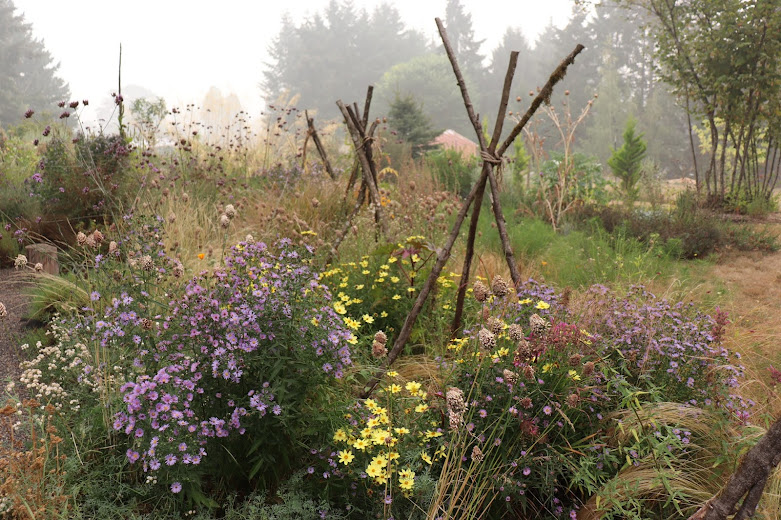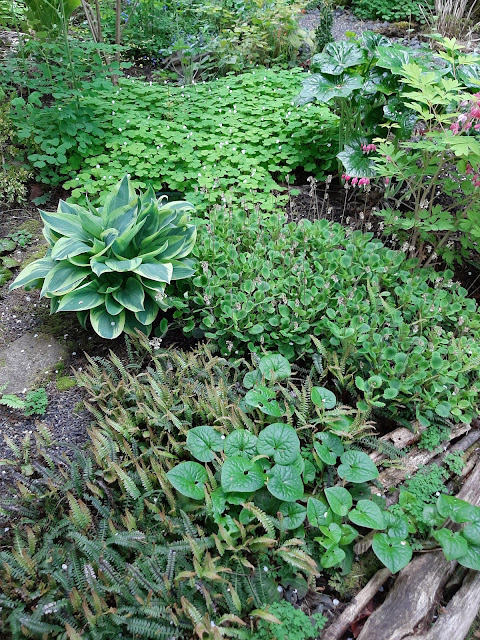Smoke of September
September has been hard, I will admit.
The latest challenge is West Coast wildfire smoke (with an air quality index of 526 as I write). To put that into perspective, 100 - 150 is considered unhealthy for sensitive groups, 151 - 200 very unhealthy, 201 - 300 extremely unhealthy, and 301 - 500 hazardous. That means no outside time; in fact, the nursery has been closed for several days due to hazardous breathing conditions. Here we are basically stuck inside. The smoke has been extreme the five days and just flat-out bad even longer than that. But, it will clear at some point, maybe later this week. For the (eventual) fresh air I will be forever grateful and for the people who have forest fires (and not just smoke) in their communities my heart breaks.
The fuel that fed the forest fires responsible for this smoke hell was a record wind storm earlier last week. It fried plants, decimated foliage and dried out already stressed soil. It took down branches and trees. There is no wetting soil when the wind is that high with basically zero humidity. To put the whole firestorm in perspective, in the words of my meteorologist friend and Xera Plants nursery co-owner Paul Bonine: A mega fire in Oregon is more than 100,000 acres. From 1900-1999 there were 6 mega fires. From 2000 to the present there have been 11 mega fires. Currently there are 4 mega fires burning at once. Unprecedented. He obtained these figures from the Oregon State Forestry Department.
September is hard.
But here's the garden all the same - even in smoke, it is what keeps me sane. The other day I donned an n-95 mask, ran like hell and snapped photos as I went. These are in random order, appropot to my mood. Here's what it looks like Sunday the 13th of September:
On a normal day you can see the neighbor's barn and Mount Hood in the background on a particularly clear day. This is true for all of these photos, I won't belabor the point in each shot.
The castor beans have grown and are quite Jurrasic looking.
Sedum 'Matrona', Arctostaphylos 'John Dourley' and Brachyglottis greyi in a rather dry area. The smoke is causing some interesting color shifts, more yellow-ish than usual.
The large trees in the background are on our property to give an idea of the visibility.
Solidago 'Fireworks' is in full bloom and looking wonderful. The bees love it, but they aren't really out right now because of the smoke. If you think about it, beekeepers use smoke to calm them down so they may inspect bee hives. It's no wonder we haven't seen many bees this past week.
While the "grass" is usually dormant this time of year even without drying winds and forest fires, it looks especially dead right now in this smoke-filtered light.
Many veggies are still going strong and the question of whether they are safe to eat has come up in many garden groups online. With a good wash, they should be fine, so says our local extension service (Master Gardeners).
We've waited all summer and now, finally, it's time for asters to shine. Here A. 'Winston Churchill' is an especially bright spot. For late-season color, pollinator superstar asters cannot be beat.
Mordor?
The pumpkins are going well in their new location this year, many of the Winter Luxury pie pumpkins are turning bright orange. That's a good thing.
Yellows seem more intensified in this smoke.
Greys seem duller, browner.
I did find random honeybees, this one on Caryopteris 'Dark Knight', another sleeper plant that doesn't even think about blooming until late August or early September. A wonderful pollinator plant.
Rose hips of Rosa glauca, possibly my favorite rose. I don't go in for the fluffy hybrids as much as I appreciate species roses.
The few, precious apples on one of two Honeycrisp apple trees. There were a decent amount of apples overall this year, we were happy with their progress. Now if the persimmons, plums, pears and cherries get the memo, we'll be ecstatic.
This view doesn't actually look so bad. Hesperaloe parviflora spike foreground, left.
Around to the other side of the house, the berm garden is doing fine. There will be yet a few small tweaks this fall when the rains eventually return. No moving of plants now, the soil is too damned dry and crunchy. They wouldn't fare well.
Finally, a couple of shots to illustrate what the winds did. We watered rigorously the days leading up to the windstorm, even the day of. Even still, many plants just couldn't handle the drying air. This little Blechnum penna-marina was all upright and happy before the winds, now even after several soaks it is still pretty bad. Large clumps of it are outright dead.
Most of my Ribes sanguineum, flowering currants, look like this. The leaves turned pale, dry and brittle before dropping. It's totally defoliated by now. They just gave up the ghost. I think they will be fine next year, let us hope.
The worst part of all of this is knowing the land is on fire, people and animals are displaced at an alarming rate and it will likely be the norm in the decades to come. Let us hope not, but I see no evidence to make me think otherwise. Even still, I will continue to garden. We have a sign in the barn at the nursery where I work that reads "Even if the world were ending tomorrow, I would still plant my tree today."
So be it. I will plant that tree.
That's a wrap for this smoky week at Chickadee Gardens. Please stay safe, stay indoors if you can and pray for rain.
Thank you to all the firefighters, first responders, volunteers, National Guard, Oregon Forestry Department, Governor Brown, emergency services, all the fab people in Columbia County and elsewhere who donated to the cause at the fairgrounds -- the amount of donations and people there I saw was overwhelming. We'll get through this together.

























.JPG)






Former Portlander appalled at the fires, the devastation, the hazardous smoke who is keeping you all close in my heart.
ReplyDeleteThank you Barbara. This has to get better. Let us hope.
DeleteWhat a year. The ferocity of these fires is terrifying and the casualties heart rending. Am always amazed at how resilient plants are to these extremes so hopefully your crispy subjects will be rejuvenated next year. Have noticed here with all the smoke in the air squash and tomato ripening has slowed almost to a crawl. Keep yourselves safe.
ReplyDeleteYou are so right, plants are resilient, many are adapted to fires and recover fine.
DeleteI think mine will be fine, I'm not that worried about them, actually - considering how much so many others have lost.
Interesting about ripening being delayed, I hadn't thought of that but it makes sense...no sun getting to them. Wow. Something to learn every day. Take care, be well.
I'm so sorry that you are going through this, Tamara. The wildfire devastation in Oregon, Washington and California is heartbreaking and piling this experience on top of a pandemic is a cruel turn to say the least. Your garden looks wonderful even through battered and bruised by wind and smoke. I'm sure it'll recover once the smoke clears out and you're able to tend to its needs. Our air quality here, although nowhere near as bad as yours, has been in the very unhealthy category for several days but, last night and this morning, it was in the moderate category and I took advantage of that to do some watering as it's been hot here. Our AQI is forecast to climb into the red zone again today as it heats up but I'm hoping (praying) for cooler temperatures and consistently better air this weekend.
ReplyDeleteThank you, Kris. You guys, too - you experience this often, I'm afraid. The combination of this and everything else going on in the world is at times almost more than we can take - but we're lucky, we have our homes and each other and the animals are all fine, so we count our blessings.
DeleteI hope the breezes come to you too - as I write this our air quality has improved significantly to about 200 - we're on the mend.
Oh, the watering. That's exactly what we've been doing today as we can.
I hope your AQI goes to the green zone, I pray for you guys too!
Challenging times. Where is that rain we've been promised over and over? Looking forward to the days we can all be together again.
ReplyDeleterickii
Ah, indeed. The rains? Hopefully tonight, Miss Rickii. Us too, looking forward to the days when we can connect again. This bites, but better days are ahead.
DeleteYour image of the Blechnum penna-marina tells the tale. No matter what we did to try and minimize the damage it still happened. The garden trashed as it was at it's end of summer height. Ugh.
ReplyDeleteUgh is right, Danger. Hopefully we've all had a chance to do a bit of clean up in our gardens now that we can breathe again!
DeleteThis will be a summer to remember and not in a fond way. Your garden has been so healthy I hope it can withstand this assault.
ReplyDeleteOh, you are spot-on, Lisa. I do think my garden will be fine in the end -- long term, though, I kind of worry about the large trees to be honest.
DeleteNo not Mordor. The smoke will pass and it will be the Shire again. Thanks for braving the smoke to share your beautiful garden. Endure!
ReplyDeleteThank you Hoover Boo. Your words keep ringing in my ears as I survey the recovering garden and think "yes, she's right...it's not Mordor" - I guess I was being dramatic. Endure indeed, all of us!
Delete